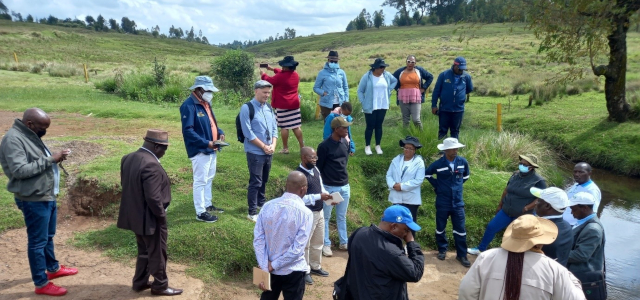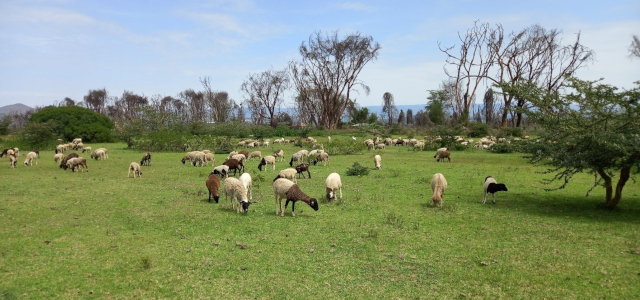The team that visited Tanzania and Kenya included Directors from the Ministries of Energy and Meteorology, Local Government and Chieftainship, Water, Agriculture, and Food Security, Development Planning, Forestry, Range, and Soil Conservation. Other stakeholders were from the Integrated Catchment Management - Coordination Unit (ICM-CU), the German Development Agency (GIZ), and GWPSAF.

Stakeholders on the learning visit hold on-site discussions
The team from ReNOKA learns best practices such as impactful extension services, community engagement, soil and water conservation, scaling out and deep intervention, afforestation and reforestation, resource mobilization strategies, development of policies, strategies, and catchment operational plans, and the importance of citizen science and local level stakeholder engagement.
ReNOKA is an inclusive and holistic movement aimed at protecting and conserving the natural resources of Lesotho and the Orange-Senqu River Basin. Under the Program, stakeholders are dedicated to the restoration of water, land, and the long-term prosperity of all communities in Lesotho and the wider Orange-Senqu River Basin. Lesotho is central to the implementation of the ReNOKA program due to its geographic position in the Orange-Senqu River Basin.
Dr. Koetlisi Koetlisi, GWPSAF Program Manager for ReNOKA, said the visit was organized to support the long-term sustainability of the Program in Lesotho so that all implementing partners are exposed to new knowledge, regional and international best practices, and to equip them with critical skills to champion the Integrated Water Resources Management (IWRM) and Integrated Catchment Management (ICM) in the river basin.
"Learning is an ongoing process, embrace it, localize innovation, implement and support scaling out and deep, which will eventually inform scaling up and hence operate better when being guided by practical policies," said Dr. Koetlisi.
According to Dr. Koetlisi, the learning journey has motivated participants to implement adaptable land and water management best practices, cash for asset techniques that enhances community sense of ownership around interventions, the importance of different associations with a given watershed, strategies of knowledge provision to individual lead farmers and associations, and use of organic consumables for improved agricultural and environmental productivity.
Dr. Rats'ele Rats'ele, one of the directors who was on the visit said, “We have learned valuable lessons; simple farm to farm, farm-level intervention's impact aggregates to a broader impact, making it easy to scale out, deep, and up. ”
In Nyandarua County in Kenya, Sasumua Water Resource Users Association Chairperson said; "We are proud of the impact of the interventions in Tanzania and Kenya and our children are proud to drink the water their parents and grandparents have protected and conserved."
The ReNOKA program is being implemented by GIZ, GWPSA and ICM-CU with financial support from European Union and the German Federal Ministry for Economic Cooperation and Development.
